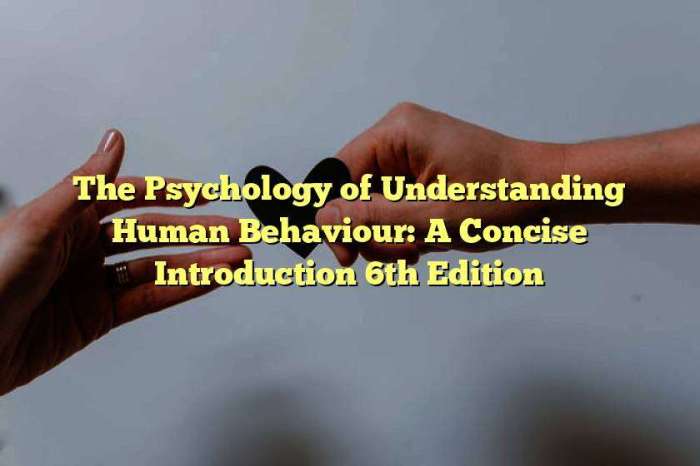Psychology a concise introduction 6th edition – Psychology: A Concise Introduction, 6th Edition, embarks on a journey into the captivating realm of psychology, a scientific discipline dedicated to unraveling the intricacies of the human mind and behavior. This comprehensive text delves into the foundational concepts, methodologies, and applications of psychology, providing a thorough understanding of the field’s diverse perspectives and its profound impact on our lives.
Through engaging prose and cutting-edge research, this book explores the biological underpinnings of behavior, the cognitive processes that shape our thoughts and actions, the emotional experiences that drive our motivations, and the social influences that mold our interactions. It illuminates the complexities of human development, the challenges and opportunities that accompany each stage, and the clinical applications of psychology in addressing mental health disorders.
Introduction to Psychology
Psychology is the scientific study of behavior and mental processes. It is a broad field that encompasses a wide range of topics, including human development, cognition, emotion, motivation, social behavior, and clinical psychology.
There are many different perspectives in psychology, each with its own unique set of assumptions about the nature of human behavior. Some of the most common perspectives include:
- The biological perspectivefocuses on the role of the brain and other biological factors in behavior.
- The cognitive perspectivefocuses on the role of mental processes, such as attention, memory, and thinking, in behavior.
- The behavioral perspectivefocuses on the role of learning and environmental factors in behavior.
- The humanistic perspectivefocuses on the role of free will and personal growth in behavior.
Psychology has a long and rich history, dating back to the ancient Greeks. However, it was not until the 19th century that psychology began to emerge as a scientific discipline. The first psychology laboratory was founded in 1879 by Wilhelm Wundt in Leipzig, Germany.
Research Methods in Psychology

Psychologists use a variety of research methods to study behavior and mental processes. These methods include:
- Observational methodsinvolve observing and recording behavior in natural settings.
- Experimental methodsinvolve manipulating one or more variables to determine their effects on behavior.
- Correlational methodsinvolve studying the relationship between two or more variables without manipulating either variable.
- Case studiesinvolve studying an individual or small group of individuals in depth.
Each of these methods has its own strengths and weaknesses. Observational methods are useful for studying behavior in natural settings, but they can be difficult to control. Experimental methods are useful for determining cause-and-effect relationships, but they can be artificial and may not generalize to real-world settings.
Correlational methods are useful for studying relationships between variables, but they cannot determine cause-and-effect relationships. Case studies are useful for studying individuals in depth, but they can be difficult to generalize to other individuals.
Biological Bases of Behavior
The biological perspective focuses on the role of the brain and other biological factors in behavior. This perspective is based on the assumption that behavior is ultimately determined by the activity of the nervous system.
The nervous system is a complex network of cells that communicates with each other using electrical and chemical signals. The brain is the central part of the nervous system, and it is responsible for controlling most of our thoughts, feelings, and behaviors.
The endocrine system is another important biological factor that influences behavior. The endocrine system is a network of glands that secrete hormones into the bloodstream. Hormones are chemical messengers that travel throughout the body and affect the activity of cells and organs.
The genetic basis of behavior is another important area of research in biological psychology. Genes are the units of heredity that are passed down from parents to children. Genes influence a wide range of traits, including physical appearance, personality, and intelligence.
Cognitive Processes

Cognition refers to the mental processes involved in acquiring, storing, and using information. Cognitive processes include attention, memory, thinking, and language.
Attention is the process of focusing on a particular stimulus or thought. Memory is the process of storing and retrieving information. Thinking is the process of using information to solve problems and make decisions. Language is the process of communicating with others using words.
Cognitive processes are essential for everyday functioning. They allow us to learn new things, remember important information, solve problems, and communicate with others.
Emotion and Motivation
Emotion is a complex psychological state that involves feelings, thoughts, and behaviors. Emotions can be positive (e.g., happiness, love) or negative (e.g., sadness, anger). They can be mild or intense, and they can last for a short period of time or for a long period of time.
Motivation is the process that drives behavior. It is the force that moves us to act and to achieve our goals. Motivation can be either intrinsic (e.g., the desire to learn something new) or extrinsic (e.g., the desire to get a good grade).
Emotion and motivation are closely related. Emotions can motivate behavior, and behavior can influence emotions. For example, the emotion of fear can motivate us to avoid danger, and the behavior of helping others can make us feel good.
Development
Development refers to the changes that occur in individuals over time. These changes can be physical, cognitive, emotional, or social. Development is a lifelong process that begins at conception and continues through adulthood.
There are many different factors that influence development, including genetics, environment, and culture. Genetics play a role in determining our physical appearance, personality, and intelligence. Environment also plays a role in development, including the family environment, the school environment, and the peer group environment.
Culture also plays a role in development, including the values, beliefs, and customs of the culture in which we live. Development is a complex process that is influenced by a variety of factors.
Social Psychology

Social psychology is the study of how people think, feel, and behave in social situations. Social psychologists are interested in understanding how our interactions with others affect our thoughts, feelings, and behaviors.
There are many different theories of social behavior, including:
- The social identity theoryfocuses on how our social identities influence our behavior.
- The social exchange theoryfocuses on how we exchange rewards and costs in our social interactions.
- The social comparison theoryfocuses on how we compare ourselves to others.
Social psychology is a fascinating field that helps us to understand how we interact with others and how our social interactions affect our lives.
Clinical Psychology
Clinical psychology is the branch of psychology that focuses on the diagnosis and treatment of mental disorders. Clinical psychologists use a variety of therapeutic techniques to help people with mental disorders, including:
- Psychotherapyinvolves talking to a therapist about your thoughts, feelings, and behaviors.
- Cognitive-behavioral therapyfocuses on changing negative thoughts and behaviors.
- Medicationcan be used to treat some mental disorders, such as depression and anxiety.
Clinical psychology is a vital field that helps people with mental disorders to improve their lives.
Helpful Answers: Psychology A Concise Introduction 6th Edition
What is the scope of psychology?
Psychology encompasses the scientific study of behavior, mental processes, and the interactions between individuals and their environment.
What are the different perspectives in psychology?
Major perspectives in psychology include the biological, cognitive, behavioral, humanistic, and psychodynamic approaches.
How has psychology developed as a scientific discipline?
Psychology’s roots can be traced back to ancient philosophers, but it emerged as a formal scientific discipline in the late 19th century with the establishment of experimental psychology laboratories.
What are the strengths and weaknesses of different research methods in psychology?
Each research method has its own advantages and disadvantages. For example, experiments provide strong control over variables, but they may not always generalize to real-world settings.
What are the major subfields within psychology?
Some of the major subfields within psychology include cognitive psychology, developmental psychology, social psychology, and clinical psychology.